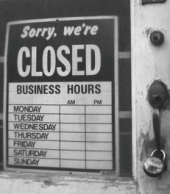Before it ever arrived at the president's desk for signature, the health reform act contained a fatal poison pill.
The most creative sector of the business community has a dagger at its heart in the form of the relentless, unyielding, and over burdening cost of health insurance. The self-employed and very small businesses have seen their insurance premiums climb 20% to 75% since 2009. To purchase an adequate family plan, a self-employed person will pays an amount 50% to 70% of the nation's median personal income, $32,000 a year, for family health plan. This includes premiums, deductibles, and out of pocket expenses. That is twice the cost for relatively generous plans at medium to large size companies. Very small businesses, two to twenty employees, pay about the same (Image: Paul Henman)
Wasn't health reform supposed to take care of just this sort of inequity? Didn't the title of the bill say it all? The Patient Protection and Affordable Health Care Act There
is no protection for the self-employed when they have these stark
choices facing them due to unaffordable insurance rates. They can give
up working for themselves; buy adequate insurance and take a huge hit to
income; buy a substandard plan and hope that whatever comes up is covered; or, abandon insurance at real risk to their health and, in some cases, their lives.
![]()
What would the country be like if here were no self-employed individuals, no very small businesses?
Apple started out as two entrepreneurs in a garage. Microsoft began
as a small tech company in Albuquerque, New Mexico. There is an impressive list of high revenue, high performing companies that traveled the route of self-employment and very small businesses.
The nation cannot afford to lose the extraordinary resources offered by the self-employed and very small business sector. It cannot afford the loss of small businesses that provide services like your favorite diner; solo and small group health practitioners; repair people; computer consultants; yard services; etc. The list goes on.
Business creativity and personalized services are on the chopping block, all because the self-employed can't afford their health insurance anymore than they can afford to risk their lives without adequate insurance.
This did not happen by accident. Before it ever arrived at the president's desk for signature, the health reform act contained a fatal poison pill.
State Insurance Commissioners in Charge
The very same people who failed miserably to protect the self-employed and small businesses in the past are now in charge of protecting them in the future. They were written into the health reform legislation early on. They have powers to determine the share of insurance premiums spent on your medical care and much more.
We were told that the president's healthcare reform legislation was special; that it would force insurance companies to spend the following shares of insurance premiums on actual medical expenses: 80% for single plans (individual and family) and 85% of premiums for small businesses. This was implemented for 2010.
Medium to large sized companies self-fund their health benefits. They pay the costs and have insurance companies manage the plans. These firms already spend 85% or more of their health benefits on medical care.
The self-employed and very small businesses are different. They cannot self fund their healthcare. They must buy directly from health insurance companies.
That is where the state insurance commissioners come in. Their group is called the National Association of Insurance Commissioners (NAIC). This association wrote the federal regulations that define what is and what is not considered medical care. Their definitions influenced insurance premiums. By doing that, they determine how quickly companies have to meet the 80-20 or 85-15 ratios referred to as medical loss ratios (MLR). Prior to this national standard, MLRs required by state regulations were any where from 55% to 70% for medical care.
NAIC was named to write more than just MLR regulations for the act (see Appendix). The regulations are implemented by the federal Department of Health and Human Services. NAIC defines allowable delays to putting the ratios in place. It defines "market destabilization" and "credibility" factors that allow an adjustment of MLRs in favor of insurance companies. The state insurance commissioners association has the broadest of powers to determine the quality, quantity, and cost of medical care.
Hijacking Health Reform Legislation
NAIC is a $75 million dollar organization. A third of its income comes from health insurance companies who pay fees to access data that NAIS collects. The association gains income from the very organizations they are tasked to regulate in the states. These are also the same insurance companies who are highly dependant on the health reform MLR and other regulations NAIS is writing for the new health care act.
There is a clear appearance of undue influence on NAIC by the insurance companies that help fund the organization. In 1998, Ralph Nader wrote an open letter demanding independent funding for the group to reduce this influence. To make his point, Nader described a NAIC research finding on minority discrimination that upset the health insurance companies. The companies simply withheld payment for data fees, the core income for NAIC, until NAIC "backed off" of its position. The letter exposed an ongoing problem but failed to generate any change.
(Note: You can view every article as one long page if you sign up as an Advocate Member, or higher).






